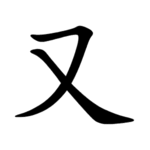Radical 29
| 又 | ||
|---|---|---|
| ||
| 又 (U+53C8) "right hand" | ||
| Pronunciations | ||
| Pinyin: | yòu | |
| Bopomofo: | ㄧㄡˋ | |
| Gwoyeu Romatzyh: | yow | |
| Wade–Giles: | yu4 | |
| Cantonese Yale: | yauh | |
| Jyutping: | jau6 | |
| Pe̍h-ōe-jī: | iū | |
| Japanese Kana: | ユウ yū (on'yomi) また mata (kun'yomi) | |
| Sino-Korean: | 우 u | |
| Names | ||
| Chinese name(s): | 又字旁 yòuzìpáng | |
| Japanese name(s): | 又/また mata | |
| Hangul: | 또 tto | |
| Stroke order animation | ||
 | ||
Radical 29 or radical again (又部) meaning "and", "again" or "right hand" is one of the 23 Kangxi radicals (214 radicals total) composed of two strokes.
In the Kangxi Dictionary, there are 91 characters (out of 49,030) to be found under this radical.
又 is also the 24th indexing component in the Table of Indexing Chinese Character Components predominantly adopted by Simplified Chinese dictionaries published in mainland China.
Evolution
[edit]-
Oracle bone script character
-
Bronze script character
-
Large seal script character
-
Small seal script character
The radical character 又's ancient form is a pictogram of a right hand from which the modern Chinese character 右 (right) was derived. Though 又 (again) as a modern Chinese character no longer represents the meaning of "right", the implication of "hand" is preserved in some Chinese characters fall under radical 29.
Derived characters
[edit]| Strokes | Characters |
|---|---|
| +0 | 又 |
| +1 | 叉 |
| +2 | 及 友 双SC/JP (=雙 -> 隹) 反 収JP (=收 -> 攴) |
| +3 | 叏 叐 |
| +4 | 发SC (=發 -> 癶 / 髮 -> 髟) 叒 |
| +5 | 叓 |
| +6 | 叔 叕 取 受 变SC (=變 -> 言) |
| +7 | 叙SC/JP/variant (=敘/敍 -> 攴) 叚 叛 叜 叝 |
| +8 | 叞 叟 |
| +11 | 叠SC (=疊 -> 田) |
| +14 | 叡 |
| +16 | 叢 |
Sinogram
[edit]As an independent sinogram it is a Jōyō kanji, or a kanji used in writing the Japanese language.[1] It is a secondary school kanji.[2]
See also
[edit]References
[edit]- ^ "Jōyō Kanji Hyō" 常用漢字表 [List of Joyo Kanji] (PDF) (in Japanese). Agency of Cultural Affairs, Government of Japan. Retrieved November 7, 2018.
- ^ "KANJI-Link". www.kanji-link.com. Retrieved 2023-06-02.
Literature
[edit]- Fazzioli, Edoardo (1987). Chinese calligraphy : from pictograph to ideogram : the history of 214 essential Chinese/Japanese characters. calligraphy by Rebecca Hon Ko. New York: Abbeville Press. ISBN 0-89659-774-1.
- Lunde, Ken (Jan 5, 2009). "Appendix J: Japanese Character Sets" (PDF). CJKV Information Processing: Chinese, Japanese, Korean & Vietnamese Computing (Second ed.). Sebastopol, Calif.: O'Reilly Media. ISBN 978-0-596-51447-1.




